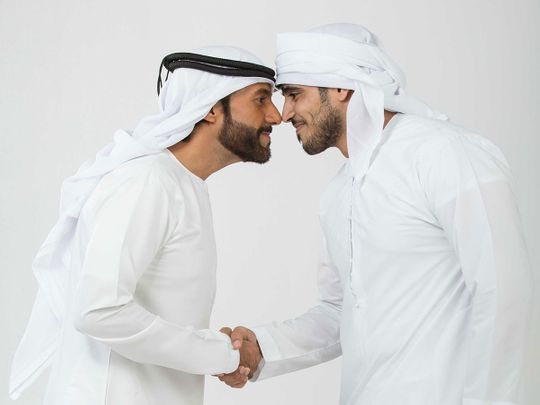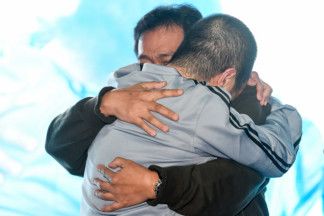
Dubai: Age-old traditions of greetings such as handshakes, giving someone a peck on the cheek or a friendly hug may be a thing of the past, feel UAE residents.
A wave, a “namaste”, ‘air hugs’ or simply saying “bon jour” or “salaam” are now the new greeting norms, they say.
Gulf News spoke to a cross-section of residents in the UAE to find out what they feel about the change and how they are greeting one another amid the pandemic.
French–American expatriate Sabine Haas said ever since the onset of COVID-19, her traditional ways of greeting family and friends have drastically changed. “It’s been strange for me. It is tough to get used to non-traditional ways. It feels totally bizarre — especially considering I have a strong French heritage.
"The French naturally greet each other with a peck on the cheek to say hello. This dates back to the Romans and it is so hard to break now! If you are from the north of France, you plant a kiss on both the cheeks and an extra third. If you are from the south, this and an occasional hug complete the greeting. This is customary with strangers too. It has been this way for decades.”
She said such a greeting is significant of the lineage people carry of a Latin warm blood. “Such a greeting denotes respect, friendship and affection. Now that is being scorned at. What the virus has done is sad - it has not just changed our lives, but our traditions and customs too.
“Today, I want to kiss my sisters, brothers, cousins and aunts but cannot do so. There is resistance from my family as there is a belief that it’s not a responsible act to kiss and hug as it could propagate the virus. It feels awkward and sad. Back in France, I hear that even in a work setting, handshakes are giving way to a ‘bon jour’.”
Social experiment
Indian expat Preeti Bindra living in Dubai could not agree more. She said a global effort to eradicate coronavirus has put the culture of handshakes, hugs, kisses and high-fives on an indefinite hold. “Without preparation we are all participating in one of the greatest social science experiments of all times.”
“A firm handshake, a kiss on the cheek, a nice warm hug were among the polite gestures we made when meeting our family and friends in the past. Now we need to come up with new ways of saying ‘hello’ to meet social-distancing guidelines and deliver a warm, risk-free welcome.”

‘Keeping an arm’s length’
She said being an Indian, it is not very difficult for her to not give a handshake or a hug or a peck on the cheek. “Traditionally, Indians have always greeted each other with a ‘namaste’ — placing both palms together close to one’s chest with a slight bow. This is way more appreciated and shows respect for Indian customs. Not just that Indians generally keep an arm’s length between themselves and others. We value our personal space and that of others. Having said that, the traditional customary greeting has changed for a more western style.
And now, with the pandemic, it seems Indians will go back to their roots and find more comfort in traditional ‘namaste’ style of greeting. “Afterall, when you say ‘namaste’, it signifies respect, friendship and affection for the other person. I also think ‘air hugs’ will get popular. Personally, I would also tell someone ‘I love you’ especially to a close friend than physically hugging the person.”
‘Strange to just wave a greeting’
But for a British expat, the new socially distant greeting will be hard to get used to. Alexandra Saikkonen-Williams, 33, said: “A handshake is the common way of greeting for a British national. In fact, the handshake must be firm, yet not too strong. When greeting a close friend, we always hug and kiss one another on the cheek. So it will be strange to just wave a greeting.
"Unfortunately, I see this will be the new norm of greeting. People are not going to be comfortable greeting strangers as openly as they did before. Hugs and kisses within households will still be normal. But greeting strangers will change radically. It is sad as it will feel a bit distant. If you see in a business scenario, a deal is sealed with a firm handshake. It builds trust and confidence in the deal and the new business relationship. I feel now people will be forced to prove their trust and confidence all the more. There is a sense of gap.”
Read more
- UAE and India reiterate closer bilateral ties in health-care sector
- Grid connection of UAE’s Barakah Nuclear Power Plant is yet another milestone, says FANR
- Watch: UAE has given Dh108 billion worth of aid to 42 countries in five years
- 59% of UAE parents prefer distance learning for first academic term 2020/21
Sri Lankan expat Mitch Perera, 53, will hear nothing of all this. “Despite COVID-19 and with restrictions being lifted, I am back to shaking hands.
"During the last office team meeting, we all shook hands. If you fear, you attract negative energy. Psychologically, it affects the immune system too,” he said.
But even where there are such exceptions, wearing masks and gloves makes the experience different.











